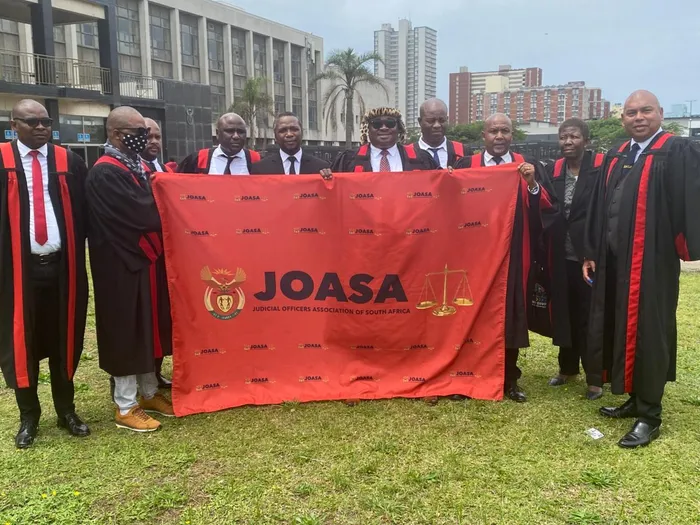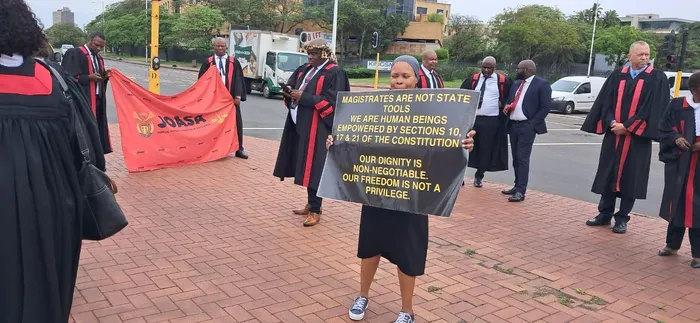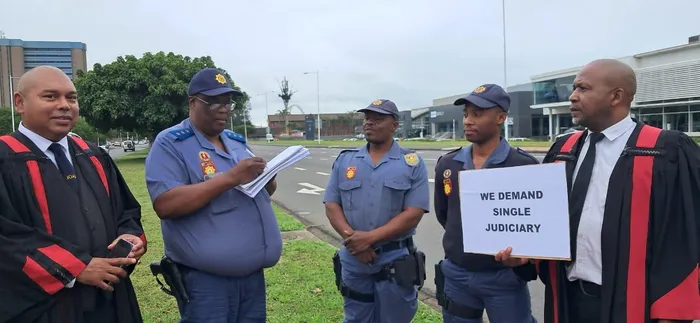Magistrates in South Africa protest for equality and better conditions

Magistrates from across South Africa gathered at the Durban Magistrates' Court to protest against systemic inequalities and inadequate conditions.
Image: Sipho Jack
In a bold statement of unity to express their frustration, magistrates from across South Africa gathered outside the Durban Magistrates' Court building on Monday to raise awareness about their dire working conditions and systemic disparities forced upon them.
Neelan Karikan, the national president of the Judicial Officers Association of South Africa (JOASA), articulated the gravity of their situation and highlighted that while magistrates were responsible for 95% of the judicial work in the country, they were made to suffer significant inequalities compared to high court judges.
The protest action gave them the platform to gather and express their grievances, which included critical issues such as inadequate remuneration, the lack of essential resources, and insufficient recognition in the judicial system.
“Magistrates are capable of handing down life sentences and presiding over significant civil matters, yet we find ourselves without parity in benefits compared to high court judges,” Karikan asserted.
“There are foundational issues affecting our ability to serve justice effectively. Our facilities are crumbling, and we lack basic tools, such as research facilities and reliable internet access.”

Magistrates protesting outside Durban court on Monday,
Image: Supplied
The call for reform has been exacerbated by financial disparities, with prosecutors in some instances said to be earning more than magistrates, which Karikan claimed was untenable.
The commitment from the Minister of Justice and the former Chief Justice Mogoeng Mogoeng has been questioned, particularly in light of the magistrates’ ongoing struggle—a struggle that has seen them resort to protest action after nearly two decades without a review of their compensation.
Magistrate Sicelo Zuma reiterated the sentiments of dissatisfaction, saying, “Every year, recommendations are updated but never implemented.
This year, enough is enough. We have decided to down tools until our demands are met.” According to Zuma, the reality faced by lower court judges is that their salaries must cover all personal expenses, including housing and vehicle allowances.
As the protest unfolded in Durban, magistrates countrywide rallied for urgent attention to their plight. The mobilisation also aimed to garner international support at the upcoming G20 meeting in Johannesburg.
Various local indigenous leaders and international judicial associations have expressed their support and echoed calls for significant reform in the South African judicial system.

Members of the South African Police accepts and sign a memorundum from the Judicial Officers Association of South Africa President Neelan Karikan on Monday outside Durban Court.
Image: Supplied
The lack of financial security has apparently forced some into debt, while the adverse working conditions for the presiding officers threaten to jeopardise the integrity of the judicial process.
“We are unapologetic in our demands,” Karikan proclaimed.
“Someone must be held accountable for this ongoing neglect.” he said.
Some of their demands include:
- Immediate implementation of the Major Review recommendations
- Immediate implementation of the Cost of Living Adjustment (COLA)
- Review and reform of medical aid provisions for magistrates
- Improved security and personal safety measures for magistrates
- Provision of adequate tools of trade, including digital resources and court infrastructure
- Review of the retirement age and benefits structure
- Improved communication channels between the judiciary and magistrates
- Establishment of fair and transparent systems for addressing magistrates' welfare and cost of living challenges.
DAILY NEWS